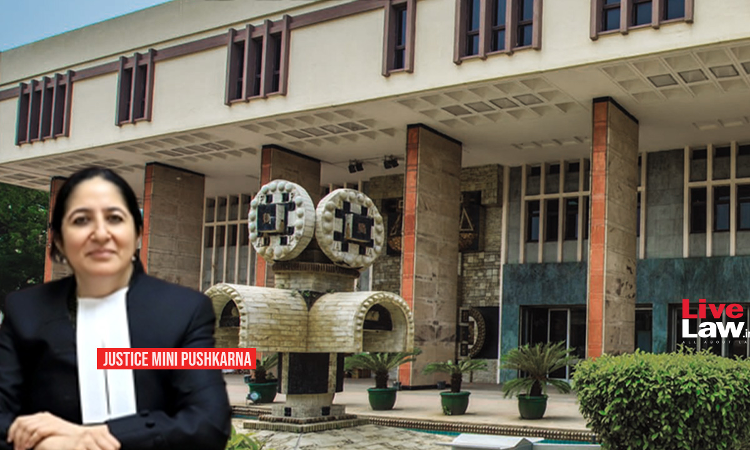- Home
- /
- High Courts
- /
- Delhi High Court
- /
- Rights Of Prior User Prevail Over...
Rights Of Prior User Prevail Over Registered Trademark Holder: Delhi HC Grants Interim Relief To German Society's Institutes In India
Kapil Dhyani
13 May 2025 6:45 PM IST
Reaffirming the principle that rights of prior user are superior to that of a proprietor holding a registered trademark, the Delhi High Court granted interim injunction in favour of Goethe-Institut, a German society which runs six educational institutes in India in the name of 'Max Mueller Bhavan', offering German language courses.Justice Mini Pushkarna restrained the use of 'Max...
Reaffirming the principle that rights of prior user are superior to that of a proprietor holding a registered trademark, the Delhi High Court granted interim injunction in favour of Goethe-Institut, a German society which runs six educational institutes in India in the name of 'Max Mueller Bhavan', offering German language courses.
Justice Mini Pushkarna restrained the use of 'Max Mueller Institute' by the defendants offering identical services, imparting German language education.
The bench emphasized, “...in the area of education, any chance of confusion should be completely avoided. The use of identical names for two institutions imparting education, would result in enormous confusion, resulting in damaging effect.”
It noted that the Plaintiff had been using the mark since 1957 whereas the defendant adopted the mark only in the year 2018.
Significant to note, the defendant contended that it holds a registered trademark whereas the plaintiff's trademark applications are pending registration. Moreover, it contended that plaintiff uses 'Goethe-Institut' as their institute name whereas 'Max Mueller Bhavan' is merely a name of a building and the same is not used as a trademark by the plaintiff to distinguish its services.
The Plaintiff on the other hand claimed that the Defendant adopted its mark and offered courses identical to those offered by the plaintiff and ironically, once the course is completed, the students have to enroll with the Plaintiff to give examinations and obtain a certificate. Thus, the impugned mark has been adopted by the defendant with the sole intention of misrepresenting its association with the plaintiff.
At the outset, the High Court emphasized that Section 34 of the Trade Marks Act, 1999 recognizes the rights of a prior user and protects its rights, which remain unaffected by any registration in favour of a party, who is a subsequent user.
“The fact that the mark of a party is not registered, is no bar to a case for passing off, if the ingredients of passing off are established,” the Court said while granting interim relief in Plaintiff's favour.
It perused various documents including newspaper reports, social media pages, MoUs, etc. which reflected that the plaintiff had always used the mark 'Max Mueller Bhavan' for its institutes/ services in India and the plaintiff's institutes are popularly known as Max Mueller Bhavan.
“The mark MAX MUELLER BHAVAN is prominently displayed outside the institutes of the plaintiff in India… Even the Government of India recognizes the plaintiff's institutes in India, as MAX MUELLER BHAVAN…Further, the invoices issued by the plaintiff to its students for educational services, being prior in time to existence of the defendant, clearly mention that “Cheques to be drawn in favour of MAX MUELLER BHAVAN”...Even the German Embassy in India in its website clearly states that in India, the GOETHE-INSTITUT operates in the name of MAX MUELLER BHAVAN.”
The Court proceeded to point out that plaintiff‟s PAN Card and bank accounts in India are in the name of MAX MUELLER BHAVAN. It said,
“It cannot be countenanced that a building has been issued a PAN Card or has bank accounts in various banks. This Court is in agreement with the submission of the plaintiff that under Indian law, a PAN Card can only be issued in the name of individuals/entities, which are capable of rendering services and receive money.”
Similarly, it took note of a suit involving the plaintiff in the name 'In Re: Max Mueller Bhavan'. The Court said,
“This again shows that MAX MUELLER BHAVAN cannot be considered as a “building name” simplicitor, as contended by the defendants, as a building name cannot act as a party in any proceeding before any authority.”
The Court also observed that defendants were well aware of Plaintiff's prior existence inasmuch as “...no certificate is provided to a student by the defendants after completion of a course with the defendants‟ institute, until and unless, the student obtains a certificate from the plaintiff.”
Thus given the 'distinctive character' possessed by Plaintiff's trademark, the Court said, “In order to create confusion in the public at large, website of the defendants also comes in the search result, whenever a person searches for the website of the plaintiff. Therefore, there exists a high possibility that a person may associate the defendants with the plaintiff. Further, the defendants also display a message that their courses are structured as per Goethe-Institut, i.e., the plaintiff. Accordingly, it is apparent, that there is every likelihood of confusion, making it difficult for the members of the trade and public, to differentiate between the services offered by the plaintiff and those of the defendants.”
Appearance: Mr. C.M. Lall, Sr. Adv. with Mr. Karan Bajaj, Mr. Suman Jyoti Khaitan, Mr. Vikas Kumar, Mr. Vihaan Kumar, Advocates for Plaintiff; Mr. Vikas Khera, Ms. Sneha Sethia, Mr. Yash Sharma, Advocates for Defendant
Case title: Goethe-Institut E.V. v. Abhishek Yadav & Anr.
Citation: 2025 LiveLaw (Del) 539
Case no.: CS(COMM) 541/2024



